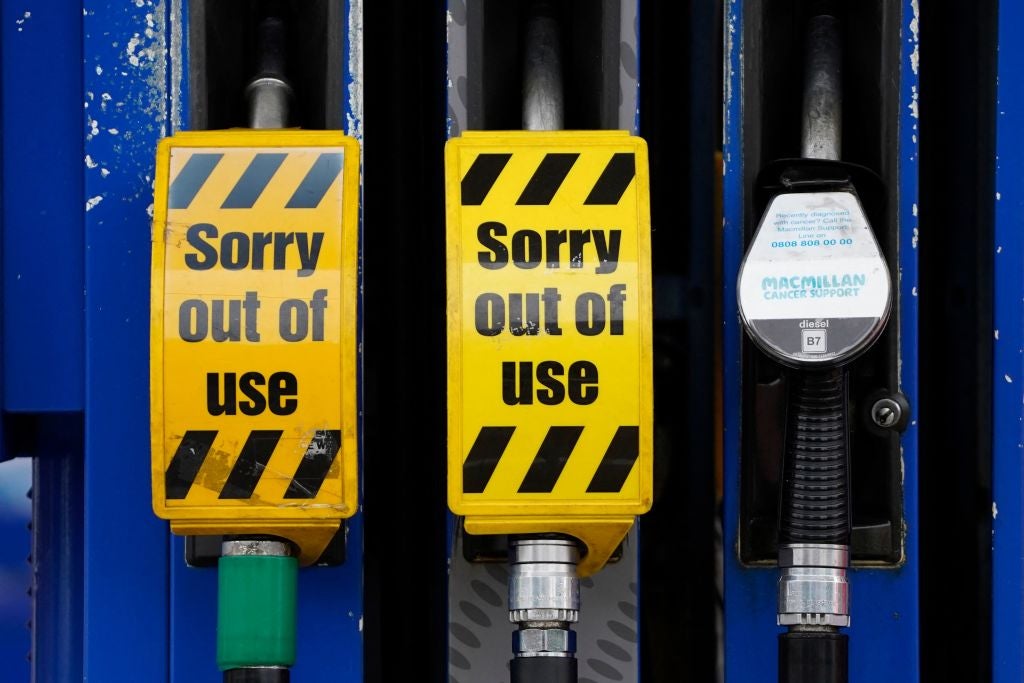Is it time for fuel coupons and a reduced speed limit to curb usage?
Please send your letters to letters@independent.co.uk

During the 1970s fuel crisis, brought about by the Organisation of the Petroleum Exporting Countries deliberately reducing the supply of crude oil, shortages of petrol and diesel at UK forecourts soon followed.
One of the remedial measures imposed by the government at the time was not only to issue fuel coupons, as previously mentioned, but also to impose a temporary national speed limit of 60mph.
This was enacted to reduce consumer demand for fuel at the time by ensuring that a significant number of motorists would need to refuel their vehicles less often.
It was a simple and effective means of reducing the pressure on the reduced fuel resources at the time.
Why has this not been considered in this instance? Given the awareness of the burgeoning climate crisis, a reduction in the national speed limit to 60mph should be being considered on a permanent basis. Or at least until the majority of vehicles on our roads are hydrogen cell or electric-powered vehicles that in turn are refuelled or recharged by excess green energy production.
Nigel Plevin
Somerset
New police commissioner
All my life I have respected and trusted our police force. I was taught as a child to seek out a policeman if I was lost or frightened. Of course in those days there were visible police officers on the beat, and most were men. As an adult woman, I continued to assume I could turn to them for protection.
The Metropolitan Police, in their advice to women when confronted by a lone officer, have actually admitted that my confidence is misplaced. Potential sex offenders appear to be acceptable recruits to the force, and complaints against them are brushed under the carpet.
Meanwhile, North Yorkshire Police commissioner Philip Allott blames Sarah Everard for her own fate, saying she should never have got into her murderer’s car.
Cultural shifts in policing are long overdue, and in order for this to happen, Cressida Dick and Philip Allott should resign.
Deborah Everett
Manchester
German drivers
My UK driving licence, issued well before 1999, allows me to drive all sorts of vehicles, including 7.5 tonne trucks. In fact, I can also tow a trailer behind it. I’m sure I am not alone in having these, apparently rare, permissions. What's so special about Germans? I don’t know whether I should be offended or bewildered by this new “initiative”. Please pass this information and my details to the Department for Transport – they’ve only got to ask. I am available.
John Reddish
Shardlow
Extreme protests
There is concern that the Police, Crime, Sentencing and Courts Bill currently proceeding through government will severely curtail the activities of those seeking to attend protests and marches that have been a long-held part of British values and rights.
Unfortunately the extreme and disruptive actions of XR and Insulate Britain are likely to have the unintended consequence of bolstering support from some of the public, as well as MPs, to implement the changes proposed in this act, and forever limiting the nature of future protests way beyond simply trying to stop individuals from glueing themselves to M25 tarmac.
Paul Davies
Oxford
Ongoing harassment
The media is correct in calling for more police action to deal with those who cause harassment to women. However, any reform carried out in police forces is only part of the necessary action.
The problem of harassment reflects society’s failure to teach proper attitudes and morality, including respect for all people, not just women. Christian faith teaches we should love all people, respecting who they are, and looking to find ways to help rather than harm them. If parents fail to educate their children about proper relationships, perhaps schools need to improve the relative importance of morality and social attitudes in their curriculum.
J Longstaff
East Sussex
Brexit chaos
Might those farmers who voted so enthusiastically to leave the EU be the same farmers who are now complaining so vociferously about shortages of staffing in meat-processing, fruit-picking, vegetable-gathering, etc?
The nation voted to escape EU bureaucracy, and business has ended up in a bureaucratic nightmare. And what about the fishermen who were going to get the run of “our” waters and sell far more fish to the EU, instead of us having to buy their catches from “our” waters? Or the manufacturers (with many worthy exceptions) who enthusiastically embraced Brexit, but who now see their just-in-time business model collapsing about their ears?
Or what about those in hospitality, construction, transport, medical services, professional services (in finance, media, culture etc), and in a hundred and one other struggling businesses and aspects of British life? Many, at least of the older generation, voted Brexit in a fantasy of regaining good old-fashioned British sovereignty and restored Victorian buccaneering national freedoms. Rather than admit they were wrong, they are now blaming Covid for problems that were predicted by “Project Fear” as outcomes of that disastrous Brexit referendum.
No doubt those in government who believe that better pay and working conditions in jobs, once done mainly by EU immigrants, may in due course entice more young British workers into unpopular industries and professions – but I am not holding my breath.
International manufacturing is a precarious and flawed business model. With more parts manufactured in the UK, we could have a better balanced and more resilient and efficient economy, and more high-quality engineering jobs. But a transformation will take many years. Moreover, we have failed to solve these problems for decades, and this hands-off government is offering no comprehensive plan.
The market alone, without government intervention and stimulus, will not resolve these issues; meanwhile, we all suffer the consequences of their inaction.
Gavin Turner
Norfolk






Join our commenting forum
Join thought-provoking conversations, follow other Independent readers and see their replies
Comments